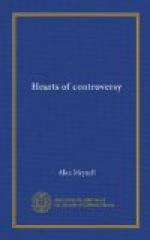As to this garden-character so much decried I confess that the “lawn” does not generally delight me, the word nor the thing. But in Tennyson’s page the word is wonderful, as though it had never been dull: “The mountain lawn was dewy-dark.” It is not that he brings the mountains too near or ranks them in his own peculiar garden-plot, but that the word withdraws, withdraws to summits, withdraws into dreams; the lawn is aloft, alone, and as wild as ancient snow. It is the same with many another word or phrase changed, by passing into his vocabulary, into something rich and strange. His own especially is the March month—his “roaring moon.” His is the spirit of the dawning month of flowers and storms; the golden, soft names of daffodil and crocus are caught by the gale as you speak them in his verse, in a fine disproportion with the energy and gloom. His was a new apprehension of nature, an increase in the number, and not only in the sum, of our national apprehensions of poetry in nature. Unaware of a separate angel of modern poetry is he who is insensible to the Tennyson note—the new note that we reaffirm even with the notes of Vaughan, Traherne, Wordsworth, Coleridge, Blake well in our ears—the Tennyson note of splendour, all-distinct. He showed the perpetually transfigured landscape in transfiguring words. He is the captain of our dreams. Others have lighted a candle in England, he lit a sun. Through him our daily suns, and also the backward and historic suns long since set, which he did not sing, are magnified; and he bestows upon us an exalted retrospection. Through him Napoleon’s sun of Austerlitz rises, for us, with a more brilliant menace upon arms and the plain; through him Fielding’s “most melancholy sun” lights the dying man to the setting-forth on that last voyage of his with such an immortal gleam, denying hope, as would not have lighted, for us, the memory of that seaward morning, had our poetry not undergone the illumination, the transcendent vision, of Tennyson’s genius.
Emerson knew that the poet speaks adequately then only when he speaks “a little wildly, or with the flower of the mind.” Tennyson, the clearest-headed of poets, is our wild poet; wild, notwithstanding that little foppery we know of in him—that walking delicately, like Agag; wild, notwithstanding the work, the ease, the neatness, the finish; notwithstanding the assertion of manliness which, in asserting, somewhat misses that mark; a wilder poet than the rough, than the sensual, than the defiant, than the accuser, than the denouncer. Wild flowers are his—great poet—wild winds, wild lights, wild heart, wild eyes!




